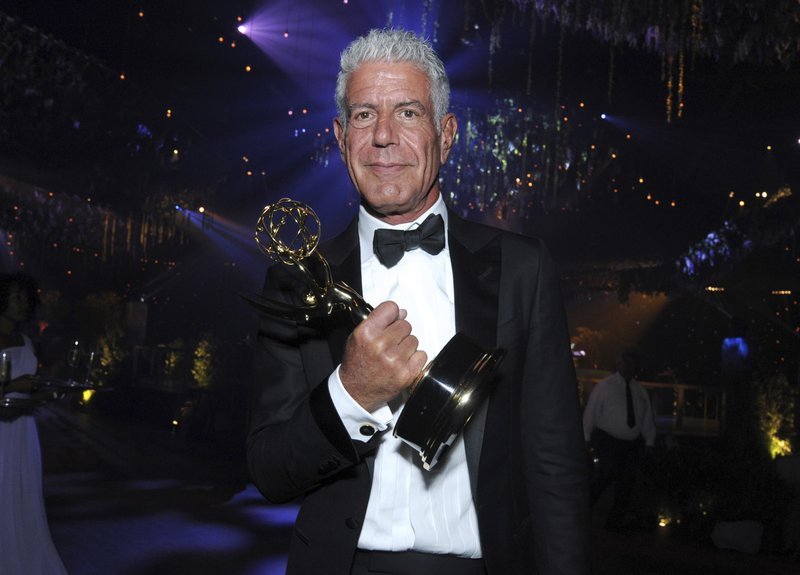NEW YORK (AP) — We thought we knew them.
Anthony Bourdain was the brash, globe-trotting chef, Kate Spade the innovative and ebullient designer. The idea that people who seemed to have such full and fulfilling lives would kill themselves is a tragic reminder that celebrities who feel more familiar to us than some of our friends and neighbors are at the same time total strangers.
“We can’t predicate the entirety of a person from the portion of the image we see on TV, or in writing, or on social media,” said Dave Itzkoff, author of a new biography of Robin Williams, who killed himself in 2014. “The reality is that it’s only a fraction of who they are, the part of themselves they choose to put out and share.”
Little was known immediately about the possible causes of Bourdain’s suicide Friday, but the deaths of Spade and Williams, among others, often lead to the discovery of suffering known to few at the time or signs of trouble in plain sight, but overlooked.
Spade’s husband, Andy Spade, disclosed that she suffered from depression and anxiety and “personal demons.” In his Williams biography, “Robin,” Itzkoff drew upon recollections of colleagues, friends and family to show a man in dire physical and emotional condition, a terrifying kind of pain those who thought of the comedian as Mork or the genie in “Aladdin” could not have imagined.

“He wasn’t in good shape at all,” Williams’ makeup artist, Cheri Minns, told Itzkoff. “He was sobbing in my arms at the end of every day. It was horrible. Horrible.”
Some famous suicides are slotted into familiar and romanticized categories — the suffering writer (Sylvia Plath, David Foster Wallace), the tormented rock star (Kurt Cobain), the lonely sex symbol (Marilyn Monroe).
But there are no rules for why or when celebrities end their lives, any more than for those who aren’t famous. Some were in the seeming midst of vital careers (Cobain, Bourdain), others killed themselves just after creative breakthroughs (Plath), and others were confronting decline.
George Sanders, the droll character actor known for his roles in “All About Eve” and “Rebecca,” was in poor health in his final years and left a note saying he was “bored.”
“I feel I have lived long enough,” wrote Sanders, who died in 1972. “I am leaving you with your worries in this sweet cesspool. Good luck.”
Bourdain, 61 when he died, had told The Associated Press in 2008 that the birth of his daughter Ariane, now 11, had made him determined not to do anything “stupidly self-destructive” if he could “avoid it.”
He had acknowledged his past troubles, writing that drug problems led to his dropping out of Vassar College.
Other darker threads emerged Friday. Patrick Radden Keefe, who wrote about Bourdain for The New Yorker, told NPR on Friday that the chef would brood about mortality and said fear was a reason for his being so “frenetically active.”
Keefe’s article from 2017 shows Bourdain’s shifts from joy to terror. The chef had traveled to Vietnam the year before for his “Parts Unknown” show on CNN, bantering with Barack Obama as the two enjoyed noodles and beer.
But after returning to France, Bourdain blacked out from taking painkillers and anti-inflammatory medicine on an empty stomach. He awoke on the ground, his head in the street.
He later emailed his first wife, Nancy Putkoksi, telling her that his message was “the sort of thing you write if you, you know, thought you were going to die.”
Ironically, Bourdain had cited his early lows in disdaining the idea that fame made life harder.
In “Kitchen Confidential,” his breakthrough best-seller and an uncommonly blunt and profane take on public life, Bourdain wrote that those who complain about the pressures of celebrity and always being “on” had never “worked a busy grill station.”
“I think of all my years cooking in hopeless restaurants — even that long period spent chasing dope or cocaine — was good preparation for a career spent in the entertainment sector,” he wrote. “It’s nice, sometimes, to know how low you can really go, what kind of bestial behavior you’re capable of in times of extremis.”






